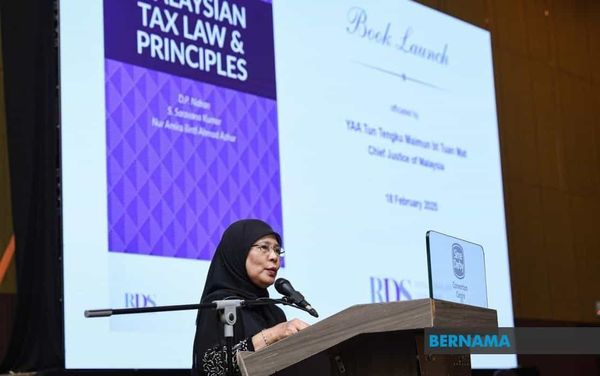KUALA LUMPUR, Feb 19 — Chief Justice Tun Tengku Maimun Tuan Mat emphasised that tax-related issues should be raised before the Special Commissioner for Income Tax (SCIT), not through judicial review in the courts.
In her keynote address, the Chief Justice clarified that the courts have jurisdiction in specialised tax matters.
“The courts have constantly upheld the principle that where a matter should be raised before the SCIT whether by way of appeal or otherwise, the matter must be raised before them and not the courts via judicial review,” she stated.
However, she noted that when it comes to the interpretation and application of law, that remains within the courts’ domain, emphasising the role of judicial review in legal questions.
An example she cited was the case involving Tenaga Nasional Berhad, where the central issue was whether ‘electricity’ could be considered a commodity, and thus entitled to certain tax reliefs.
“As you can appreciate, such is a question of law requiring judicial interpretation — a matter only the courts can engage in. The decision of the High Court was affirmed by the Court of Appeal, and the appeal in the Federal Court is pending decision,” she said.
Tengku Maimun delivered these remarks at the launch of the book Malaysian Tax Law & Principles, authored by lawyers Datuk DP Naban, S. Saravana Kumar and Nur Amira Ahmad Azhar at the Sime Darby Convention Centre, here yesterday.
She also reminded legal advocates that their roles in tax matters extend beyond their clients’ interest as the precedents they help set impact the wider public.
“So, to the esteemed members of the Bar, whether you appear for the taxpayer or the taxing authority, you must remember that any precedent you help set must not only bring justice to your client but also to the public that expects the highest level of integrity from all those tasked to uphold the rule of law,” she stated.
Tengku Maimun emphasised that while tax law is stringent, it must remain bound by legal limits to prevent abuse.
“As has been suggested earlier, the courts remain that last bastion of justice that protects the public from legal injustice,” she said.
— Bernama




